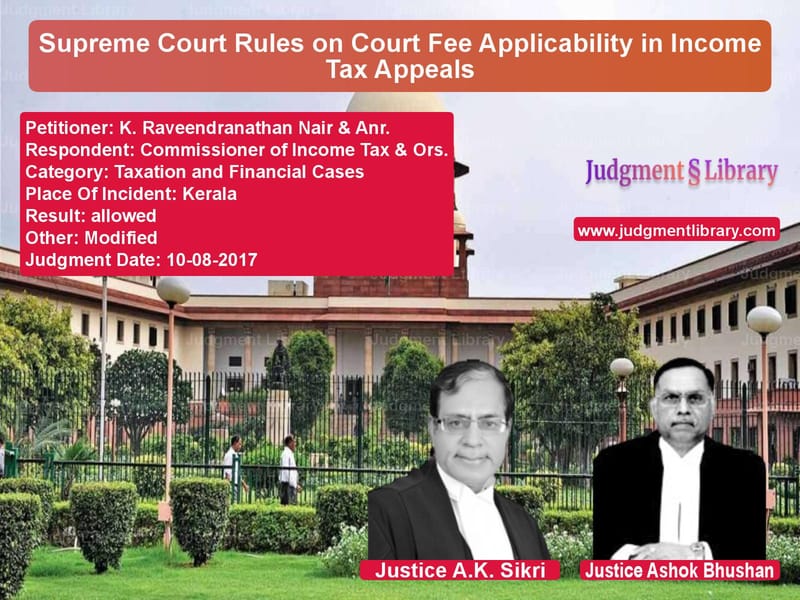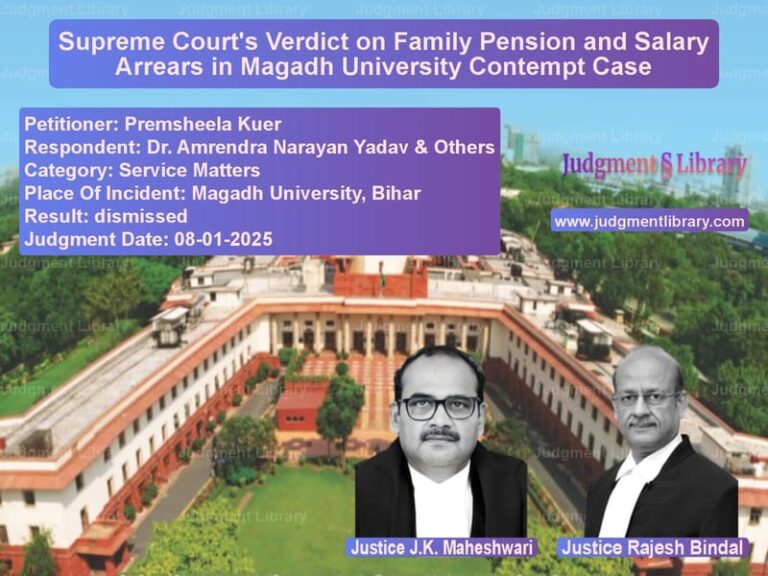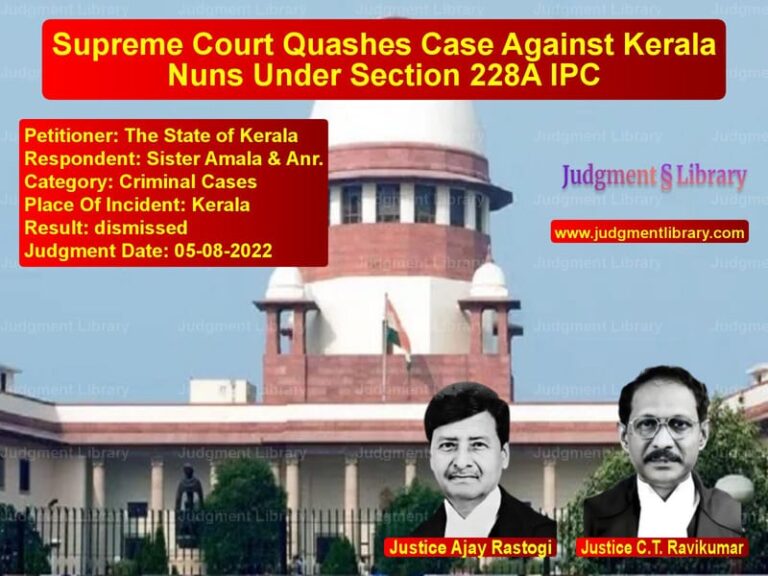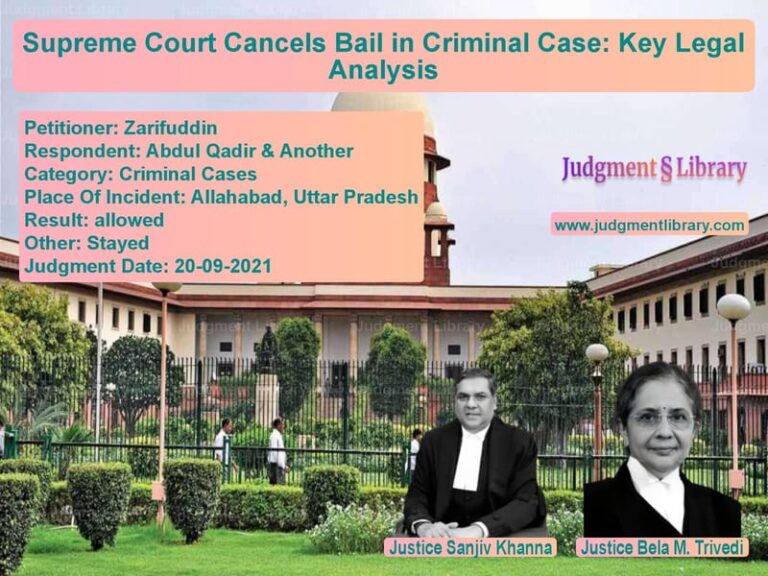Supreme Court Rules on Court Fee Applicability in Income Tax Appeals
The case of K. Raveendranathan Nair & Anr. v. Commissioner of Income Tax & Ors. revolved around the applicability of court fees in income tax appeals filed under Section 260A of the Income Tax Act, 1961. The Supreme Court examined whether the amended court fee provisions under the Kerala Court Fees and Suits Valuation Act, 1959, applied retrospectively to cases where assessment orders were passed before the amendment date.
Background of the Case
Section 260A of the Income Tax Act was inserted in 1998 to provide for a statutory appeal against orders of the Income Tax Appellate Tribunal (ITAT). Initially, under sub-section (2)(b) of Section 260A, a fixed court fee of Rs. 2,000 was prescribed for such appeals. However, this provision was omitted on June 1, 1999, leading to the applicability of state legislation in determining the court fee for appeals filed in High Courts.
In Kerala, the 1959 Act governed court fees. A 2003 amendment inserted Section 52A, which required court fees in tax appeals to be calculated at 1% of the assessed income, subject to a maximum of Rs. 10,000. This amendment took effect from March 6, 2003. The primary issue was whether this provision applied retrospectively to appeals related to assessments conducted before this date.
Key Legal Issues
- Whether the right of appeal under Section 260A of the Income Tax Act includes a vested right to a specific court fee structure.
- Whether the Kerala Court Fees (Amendment) Act, 2003, applies retrospectively to cases where the assessment was made before March 6, 2003.
- Whether the High Court erred in applying the amended fee structure to all appeals filed after the amendment date.
Arguments by the Parties
Petitioners’ Arguments (K. Raveendranathan Nair & Others)
The petitioners contended that:
- The right to appeal is a vested right, accruing when the proceedings are initiated at the lower levels, not when the appeal is filed.
- The court fee structure applicable at the time of the assessment order should govern the appeal, not the one prevailing when the appeal is filed.
- The 2003 amendment to the Kerala Court Fees Act should not be applied retrospectively.
Respondents’ Arguments (Commissioner of Income Tax)
The respondents argued that:
- The amendment applied to all appeals filed after March 6, 2003, irrespective of when the assessment order was passed.
- The right to appeal is a procedural matter, and changes in court fee laws apply to all appeals filed after the amendment, regardless of prior assessment dates.
- The High Court was correct in requiring the petitioners to pay court fees as per the amended law.
Supreme Court’s Judgment
The Supreme Court, comprising Justices A.K. Sikri and Ashok Bhushan, ruled in favor of the petitioners and set aside the High Court’s decision.
“It is a settled principle that the right of appeal is a vested right, accruing on the date of initiation of proceedings before the lower authorities. Any subsequent amendment imposing a higher court fee cannot be applied retrospectively unless expressly stated.”
The Court held that:
- The right of appeal is a substantive right and cannot be altered retrospectively by changes in procedural laws unless explicitly stated.
- The Kerala Court Fees (Amendment) Act, 2003, does not contain any provision indicating retrospective application.
- For appeals filed by assessees, the relevant date for determining court fees is the date of the assessment order.
- For appeals filed by the Revenue, the relevant date is when the disputed demand was negated by the appellate authority.
Key Legal Observations
- Section 52A of the Kerala Court Fees Act cannot be applied retrospectively to assessments concluded before March 6, 2003.
- The right of appeal is not just a procedural privilege but a vested right that must be protected from retrospective changes.
- State laws governing court fees cannot arbitrarily override a taxpayer’s vested rights in appeal proceedings.
Final Order
The Supreme Court ruled that:
- For appeals where assessments were completed before March 6, 2003, the court fee payable will be as per the law prevailing before the amendment.
- For appeals filed by the Income Tax Department, the relevant date for court fee applicability is when the disputed tax demand was overturned by the appellate authority.
- The High Court’s decision to apply the amended fee structure retrospectively was incorrect.
Conclusion
This ruling reinforces the principle that procedural amendments affecting substantive rights, such as appeal rights and associated fees, should not be applied retrospectively. The Supreme Court’s decision ensures that taxpayers and the Revenue are treated fairly regarding court fee payments in tax litigation.
Don’t miss out on the full details! Download the complete judgment in PDF format below and gain valuable insights instantly!
Download Judgment: K. Raveendranathan N vs Commissioner of Inco Supreme Court of India Judgment Dated 10-08-2017.pdf
Direct Downlaod Judgment: Direct downlaod this Judgment
See all petitions in Income Tax Disputes
See all petitions in Tax Refund Disputes
See all petitions in Banking Regulations
See all petitions in Judgment by A.K. Sikri
See all petitions in Judgment by Ashok Bhushan
See all petitions in allowed
See all petitions in Modified
See all petitions in supreme court of India judgments August 2017
See all petitions in 2017 judgments
See all posts in Taxation and Financial Cases Category
See all allowed petitions in Taxation and Financial Cases Category
See all Dismissed petitions in Taxation and Financial Cases Category
See all partially allowed petitions in Taxation and Financial Cases Category







